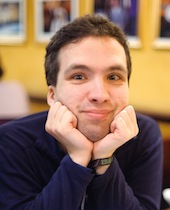Why I believe in magic 2006-09-12
There are basically three core elements (axioms?) in my worldview: empathy, systems, and self-will.
We know and predict each other through empathy. It is a succinct way to describe much of human interaction; how people are good and mean to each other; how persons are different from people; how we can understand or imagine the sentience of other beings.
Systems are at work on all levels. Social systems, worldview interactions, black-box psychology, endocrinally-meditated behavior, cognitive neuropsychology, etc. It is a manifestation of humans' ability to perceive patterns that we have so many ways of describing the world; most of them true within their domains, few of them truly in conflict. They form an immensely complex meta-(meta-meta-...)pattern. Empathy is applicable here as well, in that it is difficult to get from one system to another when their qualia differ; eg to understand "what mary didn't know" about red (google it) from a biological-physical standpoint, because it simply has nothing to say about it. Plus, you have the very simple equation: sentients + empathy -> meta system with its own properties / worldview.
Self-will is the essence of magic: the ability to influence your worldview consciously. The body, too, is a highly complex system - recursive in many ways. We can introspect; self-awareness right? Within one's own mind, Will is a real force, because it is an alternate way of phrasing "one's own mind"; a recursion.
The mystical part comes in if you view humanity - or Life - as a metasystem unto itself (certainly an internally and factually consistent view), and then consider what its Will is doing and how. This can be also described in terms of ecosystems, gaiology, etc, without the concept of will. Just as physics and free will aren't incompatible, these two are not either.
These are basically why I can be simultaneously spiritual and have a very rigorous logical/skeptical view. I am a bit sad that this is not more common. On the one hand you have the woos (as with >95% of people in empaths, a comm I moderate) who don't bother to think logically, consider Sir Ockham, think of the many and splendid ways they can delude themselves. On the other, you have the "skeptics" (like most people on forums.randi.org) who take an equally faith-based view in the exclusive mundanity of the world, e.g. hard atheism - one they have a certain righteousness about but can be both less fun, and not necessarily logically rigorous either (I've seen plenty of fallacies from the lips of 'skeptics'). (FWIW, aside from ad hominems, I haven't seen Randi himself do this - if anything he's quite consistent about not being able to prove a negative and having an apparently sincere desire to find a reliable demonstration of something that would expand his worldview.)
On the gripping hand, there's me and people like me - most of my friends fall into this category, fortunately. It can be harder, because it necessitates having multiple worldviews (systems) in your mind simultaneously, and resolving apparent-but-not-really conflicts between them. The ability to apply skepticism tempered with a humility about its domain. It is not as comfortable as the relative surety of either of the other approaches, both of which psychologically insulate themselves very well from any attacks.
I think that's about as succinct as I can be without being cryptic.








